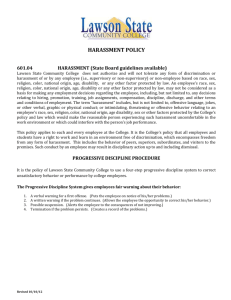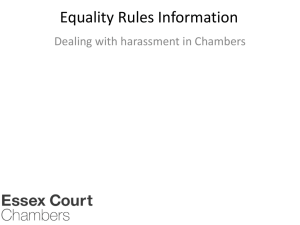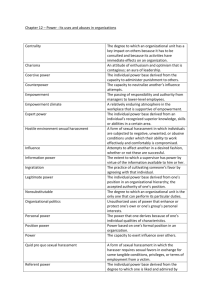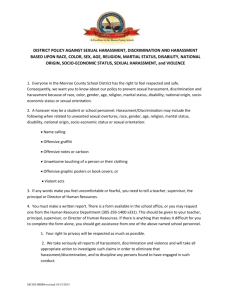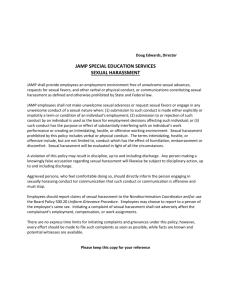harassment policy
advertisement
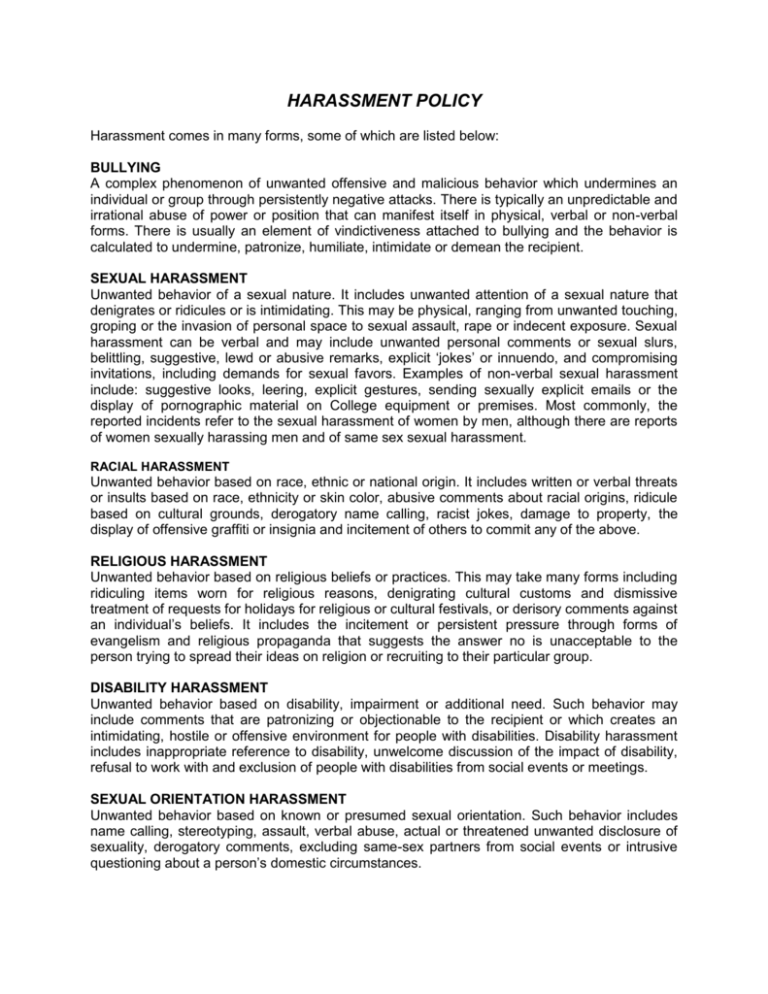
HARASSMENT POLICY Harassment comes in many forms, some of which are listed below: BULLYING A complex phenomenon of unwanted offensive and malicious behavior which undermines an individual or group through persistently negative attacks. There is typically an unpredictable and irrational abuse of power or position that can manifest itself in physical, verbal or non-verbal forms. There is usually an element of vindictiveness attached to bullying and the behavior is calculated to undermine, patronize, humiliate, intimidate or demean the recipient. SEXUAL HARASSMENT Unwanted behavior of a sexual nature. It includes unwanted attention of a sexual nature that denigrates or ridicules or is intimidating. This may be physical, ranging from unwanted touching, groping or the invasion of personal space to sexual assault, rape or indecent exposure. Sexual harassment can be verbal and may include unwanted personal comments or sexual slurs, belittling, suggestive, lewd or abusive remarks, explicit ‘jokes’ or innuendo, and compromising invitations, including demands for sexual favors. Examples of non-verbal sexual harassment include: suggestive looks, leering, explicit gestures, sending sexually explicit emails or the display of pornographic material on College equipment or premises. Most commonly, the reported incidents refer to the sexual harassment of women by men, although there are reports of women sexually harassing men and of same sex sexual harassment. RACIAL HARASSMENT Unwanted behavior based on race, ethnic or national origin. It includes written or verbal threats or insults based on race, ethnicity or skin color, abusive comments about racial origins, ridicule based on cultural grounds, derogatory name calling, racist jokes, damage to property, the display of offensive graffiti or insignia and incitement of others to commit any of the above. RELIGIOUS HARASSMENT Unwanted behavior based on religious beliefs or practices. This may take many forms including ridiculing items worn for religious reasons, denigrating cultural customs and dismissive treatment of requests for holidays for religious or cultural festivals, or derisory comments against an individual’s beliefs. It includes the incitement or persistent pressure through forms of evangelism and religious propaganda that suggests the answer no is unacceptable to the person trying to spread their ideas on religion or recruiting to their particular group. DISABILITY HARASSMENT Unwanted behavior based on disability, impairment or additional need. Such behavior may include comments that are patronizing or objectionable to the recipient or which creates an intimidating, hostile or offensive environment for people with disabilities. Disability harassment includes inappropriate reference to disability, unwelcome discussion of the impact of disability, refusal to work with and exclusion of people with disabilities from social events or meetings. SEXUAL ORIENTATION HARASSMENT Unwanted behavior based on known or presumed sexual orientation. Such behavior includes name calling, stereotyping, assault, verbal abuse, actual or threatened unwanted disclosure of sexuality, derogatory comments, excluding same-sex partners from social events or intrusive questioning about a person’s domestic circumstances. PROCEDURE Any complaint of harassment should be handled in the following manner: 1. 2. 3. The issue must immediately be taken to Sitting Bull College’s Vice President of Academics or counselors for informal discussion with both parties. Any further violation will result in written reprimand and possible suspension of employment or disciplinary dismissal until treatment or counseling or both is received. Termination or expulsion will result should behavior continue. This policy is designed to protect all employees and students from harassment in any way associated with the college environment, no matter who the harasser is. * Students, Faculty and Staff have the right to appeal (see appeals process)
